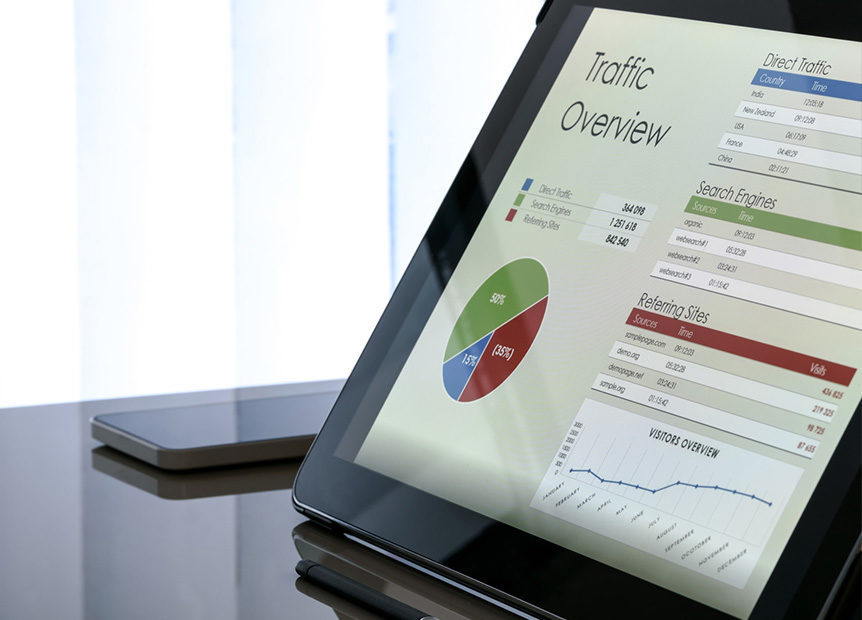Google AdWords – A Beginner’s Guide. If you’re looking at digital marketing as a way of driving traffic to your website, chances are you’ve heard of Google AdWords. But what is it, and how does it work?
In this week’s post, we’ll look at some of the basics you’ll need to know if you’re going to use AdWords for your online advertising campaigns.
Firstly, you should understand the difference between adverts and organic search results.
Adverts, of course, are paid for. With AdWords, your advert can appear when someone searches for terms relating to your product or service and it might be shown at the top or bottom of a Google search results page, depending on various factors. It will also be clearly marked as an advert.
The rest of the page will show ‘organic’ search results – links to websites with content that relates directly to the search term. So, your website might appear in this group, but your adverts won’t.
Your advert might also be shown to people who are browsing websites which include content that relates to your own.
How does it work?
When you’re setting up your AdWords campaign, you will specify some keywords – terms or phrases your potential customers are likely to use. So, if you’re an estate agent based in West Yorkshire, you might choose ‘houses for sale in Leeds’ or ‘flats to rent in Ilkley’.
By matching your keywords with your adverts, you then have the opportunity for your ad to be displayed. It might appear on a results page when someone searches using one of those phrases, or show up on other websites relating to houses for sale in Leeds, for example.
How does AdWords choose which adverts to show?
Quite simply, it works like an auction where businesses bid for their adverts to be displayed when someone searches for their chosen keywords.
AdWords works out a score – called AdRank – for every advert that determines whether it’s eligible to be shown and where it should appear. This is made up of three factors:
- Your bid. When you set up your campaign, you tell AdWords the maximum amount you want to pay every time someone clicks on your advert. This doesn’t mean you will always pay that amount – you may pay less. It depends on the maximum bid other businesses have specified for the same keywords. You can change your bid amount whenever you like.
- The quality of your advert. AdWords will assess how relevant and useful your advert – and the website it links to – are to the person who will see it. You’ll see a Quality Score in your AdWords account, and you can make adjustments to your adverts which improve this.
- Expected impact from advert extensions & other formats. You’ll have the opportunity to add additional information to your advert such as a phone number or extra web links – ad extensions. AdWords estimates the impact that these, and other advertising formats you use, will have on how your advert performs.
So what do I pay?
Cost-per-click (CPC) or pay-per-click (PPC) does exactly what it says on the tin – you only pay when someone clicks on your advert and goes to your website. You’ll have told AdWords the maximum you’re prepared to pay when this happens, but you could be charged less depending on the maximum bid others have set.
You also choose a budget that specifies the average daily amount you want to spend. AdWords will allow up to 20% more on top of this on some days so you don’t miss out on valuable potential customers, but will lower it on other days so that, over a month, it works out to the limit you’ve set.
Does it take much time to manage an AdWords campaign?
As with many areas of business, it takes more than money to make AdWords work.
You will need some time to start with to set up your account and, of course, compose your first advert. To start with, as with any new process, it will take you a bit longer but you’ll speed up as you become more comfortable and familiar with how AdWords works.
Once you’ve got a campaign running, set aside some time at least once a week to sign in, review how it’s going, and to make any changes that will improve your results.
Around 30 minutes to an hour should be plenty, although again you might want to allow a little longer to begin with.
In this article, we’ve explained the principles behind Google AdWords and how it works. In future posts, we’ll talk about best practices and how to create effective adverts that will bring you more business.

